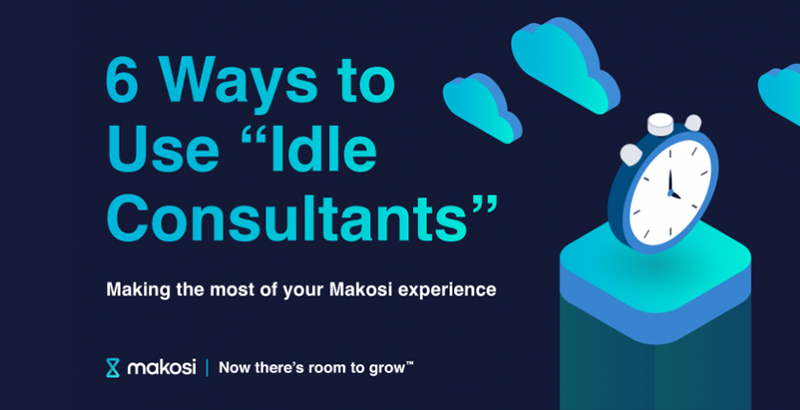Whether or not you’ve worked with a variable workforce before, adapting to its dynamics can be challenging.
On one hand, the major benefit of an on-demand workforce is that you have extra help to temporarily handle the freight train during busy seasons (which is why you should make the most of the time you have with your Makosi consultants).
On the other hand, in practice, this may be easier said than done. In fact, we’ve seen consultants end up idly waiting for projects to start, which is not ideal for anyone!
There are a few reasons why Makosi consultants can become “idle”, so we’ve prepared the list below to help you to trouble-shoot:
Client delays
Let’s say that your on-demand consultant has completed onboarding and is ready to start. This doesn’t mean your clients are. When you pre-allocate on-demand consultants to pending projects, the client and consultant timelines can be out of sync, resulting in an idle consultant, or more than one, until your client is ready to get the ball rolling.
Scheduling complications
When it’s crunch time, and all departments are flooded with work, you don’t always find the time to schedule your consultant into their respective tasks. As a result, you find yourself in a catch-22: hiring on-demand talent to help with the workload but not having the time to do proper scheduling and allocation.
Employee hesitation
If your existing employees and managers haven’t worked with on-demand talent before, they may hesitate before allocating consultants to seemingly complex tasks or important clients. They may be reluctant to use the “new” talent – so, instead of leveraging the on-demand workforce, they use staff members they’re already familiar with to help with projects.
Role confusion
Linked to the issue of employee hesitation, there’s the question, “How much knowledge do on-demand consultants have?” And, “Should we give them complex work?” Some employees are unsure about their own levels of experience and knowledge and so they quickly assign consultants simple tasks, with little to no subsequent tasks.
The solution for idle consultants
At Makosi, we believe that talent should never go to waste, which is why we’ve formulated 6 ways to apply your variable workforce – without idle hands.
1. Reach out
The best part of hiring a variable workforce through Makosi is that you have full support every step of the way. For example, if you have an idle consultant due to scheduling challenges, we can help you create a productive timeline for your consultant.
We’re here to help you lessen the workload on your employees, so feel free to reach out if you need help incorporating and allocating our team into their respective tasks.
Not only can we help with scheduling, but we’ll also offer advice on any challenges and queries you may have regarding your new workforce.
2. Teamwork makes the dream work
Although your Makosi consultants are temporary help, it’s still important to see them as part of your employee system. This way, you can ensure consistent results from both the consultants and your own employees.
In addition, once you and your employees have accepted consultants into the overall workflow, you’ll have investment surety and insight into the value of an on-demand workforce.
For example, just like your existing employees, you have complete freedom to use your Makosi consultants for other projects. HR managers and senior executives can communicate workflows and allocate consultants to priority projects when necessary.
3. Additional training
While all Makosi consultants go through basic training before deployment, they don’t have exhaustive, end-to-end the knowledge of your company, clients, and projects before joining your team. Because, they’ve not been there since the start.
Additional virtual training, resources, and skills development are a great way to teach idle consultants about your specific business and allow them to ease into your workforce.
Once you have a new project or client requiring specific knowledge, your once-idle consultant will have all the tools they need to flourish in the tasks ahead.
4. Inter-departmental workforce sharing
Never underestimate the extent of your consultant’s abilities. You may not have any accounting tasks available, but perhaps your tax or reporting departments do...
Giving your idle consultant work in another department can reduce the workload from other workforces and allow the consultant to branch out their expertise.
If you’re hesitant about their abilities, try giving them low-level tasks to get a better idea of what they’re capable of and how they can help you in future. But remember to follow up on those low-level tasks with bigger and more significant pieces of work!
5. Reviewing work
Lessen your workload by giving idle consultants the task of reviewing work - whether they’re double-checking simple details or writing memos on projects. Their attention to detail and expertise can offer a valuable additional eye for your projects.
Simply arrange a brief meeting to discuss the context of the respective project and client and let your consultant handle the reviewing.
As a result, consultants will make the most of their time at your company, and you’ll only need to oversee or check in on the intricate details of the project.
6. Shadowing
Your employees know your company, processes, and departments best, making them the perfect candidates to teach your Makosi consultants the ins and outs of your business.
Shadowing allows Makosi consultants to familiarize themselves in a practical, real-world setting while helping with any tasks along the way.
You can even send your Makosi consultant to another department, if your audit team is too busy to be shadowed, allowing them to learn new skills within your organization.
At Makosi, we believe your variable workforce should add maximum value to your business, even if this means making room to grow in creative or unusual ways.







